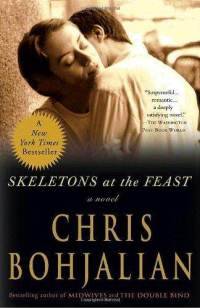
"Skeletons at the Feast" is one of Chris Bohjalian’s lesser-known novels, and I read it because he has been one of my favorite authors for a while–I have already read “Before You Know Kindness,” “Midwives” and “The Double Bind.”
"Skeletons at the Feast" is set in World War II. Now, I know what you’re thinking, because originally I thought it too: ‘another WWII novel about death and sadness, from the point of view of the Jewish people.’ There’s nothing wrong with those types of novels, but let’s face it–we’ve all read them before. And that’s what sets “Skeletons at the Feast” apart from these other novels: a different point of view.
At the center of the plot is Anna, an 18-year-old German aristocrat, who is fleeing from her home with her mother, brother, and Scottish prisoner of war boyfriend. They are heading west among thousands of other refugees running from the Russian army. Throughout the book they are also joined by a Jewish man posing as a German army officer.
Often when one reads about World War II, it is natural to write off Germans as a whole, and judge them all together as a horrible group of people who let many, many people die. But when you read about the war from their point of view, as a daughter and mother fleeing from an army and from a war that they really don’t know much about, it is much harder–just about impossible–to write off the German people in this way, and that is what I liked the most about this novel.
"Skeletons at the Feast" was surely downright depressing, with many of the main and secondary characters dying. But the central message that it conveys, not to judge a group of people by some of the group’s actions, that life can go on and become better in the midst of tragedy, is uplifting. And most of all, to always look at something from a different perspective before passing judgement.